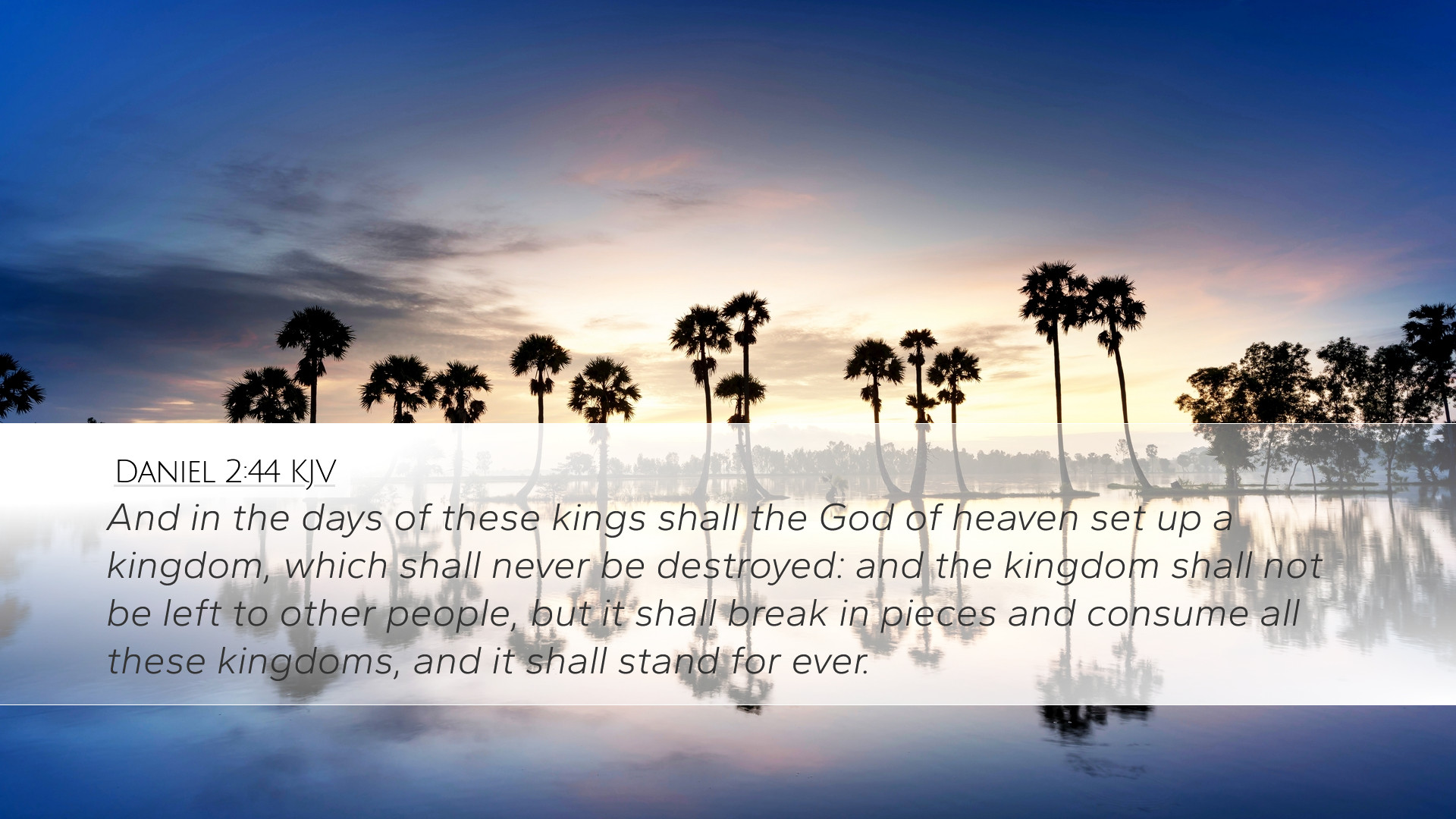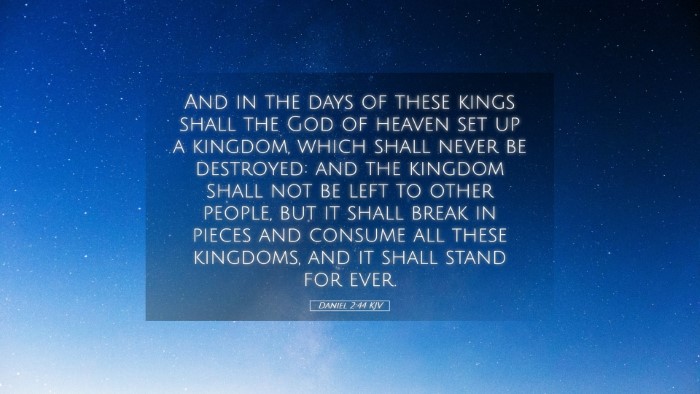Commentary on Daniel 2:44
Daniel 2:44 states:
"And in the days of these kings shall the God of heaven set up a kingdom, which shall never be destroyed: and the kingdom shall not be left to other people, but it shall break in pieces and consume all these kingdoms, and it shall stand for ever." (Daniel 2:44, KJV)
This verse is a pivotal component in the understanding of divine sovereignty in the history of human governance. The context of this verse is significant as it is part of a dream interpreted by Daniel, where King Nebuchadnezzar sees a great image representing various kingdoms through history.
1. Divine Sovereignty and Kingdom Establishment
Matthew Henry emphasizes that God's sovereignty is supreme. In the context of Nebuchadnezzar's dream, the various metals of the statue symbolize the successive kingdoms of man, while the stone that strikes the image represents God's eternal kingdom. Henry notes that this stone is the embodiment of Jesus Christ, who fulfills the prophecy of the Messiah, establishing a kingdom that transcends human authority. Henry writes:
"The kingdom of God shall be set up in the days of these kings, all shall soon perish, but the kingdom of God shall last forever." (Henry)
2. A Kingdom that Cannot be Destroyed
Albert Barnes offers insightful theological reflections on the permanence of God’s kingdom. He strongly affirms that while earthly empires rise and fall, the kingdom of God is invincible and eternal. Barnes explains that this kingdom is not established through worldly might but through the divine hand of God. The emphasis is on its incomparable nature:
"This kingdom shall be established by God himself, and no power can tear it down." (Barnes)
Barnes also highlights the eschatological implications. The coming of Christ and His reign is a fulfillment of this prophecy, marking a significant moment in redemptive history. Theologically, it reinforces the idea that believers should place their trust not in transient earthly kingdoms, but in the everlasting kingdom of God.
3. The Nature of God’s Kingdom
Adam Clarke delves deeper into the nature of God’s kingdom mentioned in this verse, emphasizing its unique characteristics. Clarke points out that this kingdom is a spiritual dominion that operates under the principles of grace, righteousness, and peace. He indicates that the phrase "shall not be left to other people" signifies that this kingdom will not fall into the hands of others; it will be directly governed by God through Christ:
"It is a kingdom that is inherently divine, not subject to the whims of humanity." (Clarke)
Clarke asserts that this kingdom will grow and expand, ultimately consuming all opposing powers, which speaks of the missionary aspect of Christianity and its global spread.
4. The Kingdom's Impact on Human History
All three commentators converge on the transformative nature of the kingdom established by God. It is not merely another kingdom among many, but a radical rupture in the history of humanity, where it “shall break in pieces and consume all these kingdoms.” This signifies a complete reversal of power structures. As Matthew Henry notes:
"God's kingdom will remove all opposition and bring to naught the pride of man." (Henry)
5. The Eschatological Fulfillment
This verse reaches deeply into eschatological themes. Albert Barnes observes that the establishment of God’s kingdom pointedly refers to the coming of Christ and the inauguration of His reign. The verse anticipates a future where God's righteousness prevails over the chaos of human governance:
"The culmination of this prophecy is found in the eternal kingdom of Christ which will become evident at His second coming." (Barnes)
6. Practical Implications for Believers
Understanding the implications of Daniel 2:44 provides profound encouragement amidst earthly turmoil. As Adam Clarke teaches, believers are assured that despite current uncertainties, God's kingdom stands immutable:
"Let believers take comfort in the assurance that they are part of a kingdom that cannot be shaken." (Clarke)
This reframes our priorities as Christians; we are called to be ambassadors for this enduring kingdom, spreading the Gospel and reflecting its values in a world of fleeting powers.
Conclusion
Daniel 2:44 invites readers into a grand narrative of divine dominion, eternal hope, and transformative purpose. The commentaries of Henry, Barnes, and Clarke collectively enrich our understanding of this powerful verse. They urge believers to recognize God’s sovereign plan amidst the chaos of human kingdoms and to live in light of the eternal kingdom that has been established through Jesus Christ.


